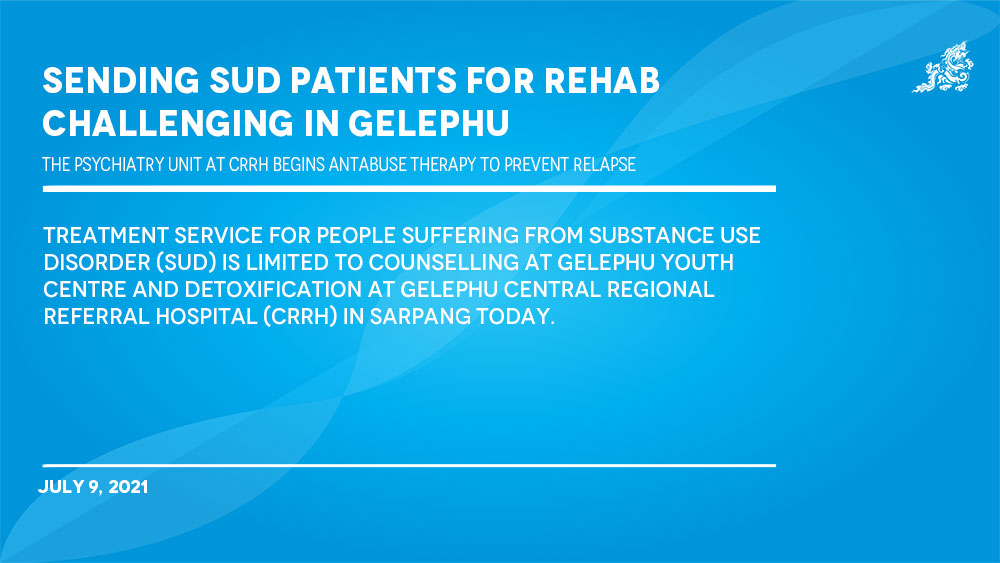The psychiatry unit at CRRH begins Antabuse therapy to prevent relapse
Nima | Gelephu
Treatment service for people suffering from substance use disorder (SUD) is limited to counselling at Gelephu Youth Centre and detoxification at Gelephu Central Regional Referral hospital (CRRH) in Sarpang today.
The Bhutan Narcotics Control Authority’s Drop-in Centre (DIC) in Gelephu provided counselling and referral services to the clients from Zhemgang and Tsirang before the pandemic.
The patients suffering from chronic addiction problems were referred to rehabilitation centres in India and Thimphu. However, the referral to rehab centres are limited today.
According to the record with the Gelephu DIC, there are over 50 people in need of immediate rehabilitation service. The number is increasing with the users switching to alcohol.
Gelephu DIC in-charge, Hemnath Layo Monger, said that the situation would improve if the clients are sent for three-month rehabilitation treatment.
“The number of people in need of the treatment could be more. Especially for the alcohol users, their condition would become worse if they don’t get immediate treatment. There is a risk of severe withdrawal,” he said.
He added that the youth who had earlier been into controlled substances and cannabis have become vulnerable to alcohol addiction. “We could have more youth with alcohol-related problems in the future. If we get into alcohol use at an early age, it’s difficult to quit.”
At the Psychiatry unit in Gelephu, the patients opting for rehabilitation treatment after detoxification have to be admitted at the unit for more than 14 days; detox course is for only 10 days usually.
The unit could refer only eight patients so far because the referral system has become expensive, having to quarantine with an attendant.
Arranging transportation is also a challenge.
A total of 73 new SUD cases related to alcohol and 11 cases related to controlled substance abuse were reported to the psychiatry unit in the past six months, excluding the patient who comes for follow-up and relapse cases.
The clinical officer at CRRH, Jigme Dukpa, said patients had to be quarantined with an attendant because quarantining patients alone was risky. “The unit also started Antabuse therapy to deter the use of alcohol after detox. There were more relapse cases and we don’t have enough human resources to handle it.”
The psychiatry unit started Antabuse therapy this year for the patients who couldn’t afford rehabilitation treatment and for the patients who couldn’t come for the regular follow-up.
“Without long-term treatment in place, the relapse cases are more. It adds pressure to the government expenditure. Family members also suffer. Referral to India is not possible,” said the official.
The psychiatry unit couldn’t conduct awareness programmes because of the pandemic.
The detox capacity for the unit is six beds. When the patients wait at the detox unit for quarantine, the new patients are adjusted to other wards. “There is also no separate unit for psychiatry and detox patients.”
Hemnath Layo Monger said there were no recreational facilities for the youth to keep themselves engaged meaningfully. “Those available are always occupied. At last, the youth end up in the bar. They become more addicted this way.”
Rehabilitation centres in Thimphu remain packed most of the time.
Another challenge is that the clients should be immediately referred to rehab centre right after the detox, which is not possible because of the mandatory quarantine, according to the official.
Hemnath Layo Monger said that the patients feel reluctant to seek help when they relapse repeatedly. “They are in the community and the people in the community are more vulnerable when more avoid the required treatment.”
Edited by Jigme Wangchuk


